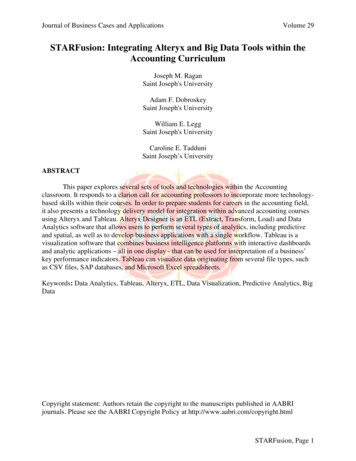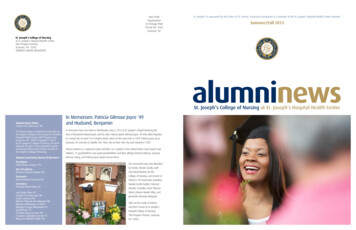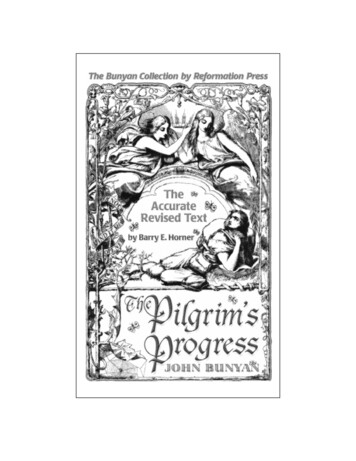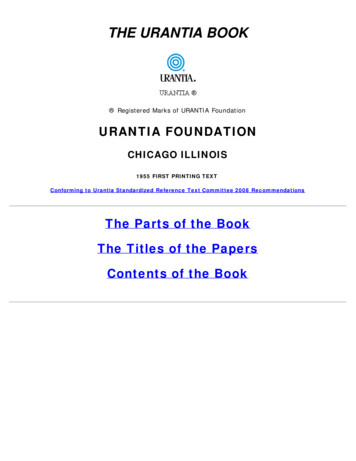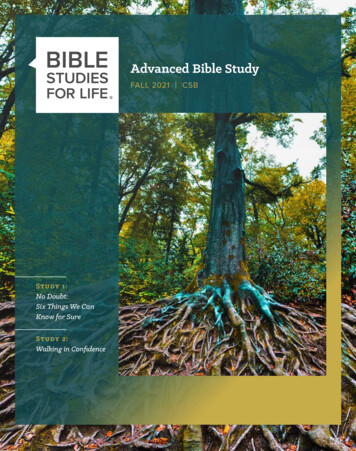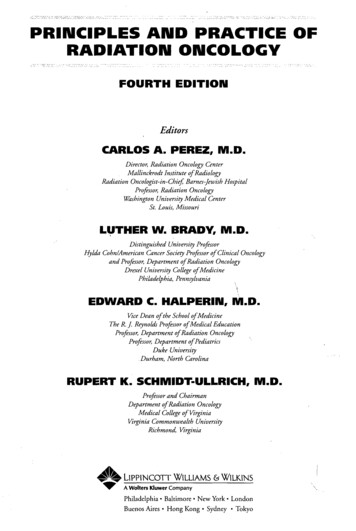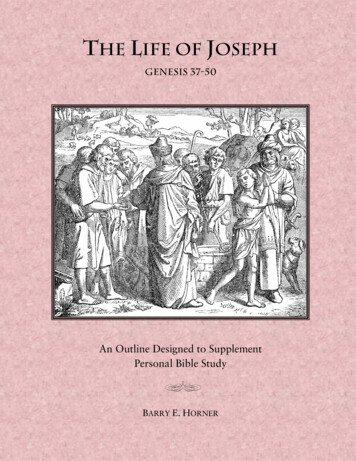
Transcription
THE LIFE OF JOSEPHGenesis 37-50An Outline Designed to SupplementPersonal Bible StudyBARRY E. HORNER
THE LIFE OF JOSEPHTEXT AND OUTLINEcopyright 2007byBarry E. HornerChrist’s New Covenant ChurchTucson, ArizonaThis text may be copied for individual andpersonal use, but not for bulk or commercialdistribution. The Bible text used in the main is that of theNew American Standard Version,unless otherwise indicated.
I GENERAL INTRODUCTIONThese notes originated from of a series of expository messages delivered at GraceEvangelical Church, Melbourne, Australia, during 1987. However subsequent study has led toexpansion of this exposition culminating in its most recent presentation at Christ’s NewCovenant Church, Tucson, Arizona, 2007. It is prayerfully hoped that they will be ofencouragement to every lover and student of the Word of God, and especially help them in theirpursuit of righteousness as exemplified in the life of Joseph and his glorious Antitype.The outlined form of presentation is intended to accompany an open Bible, and in this caseGenesis 37-50 in particular. Here is preparatory material, and certainly not a representation ofthe unction and spontaneity of the moment that no pen can reproduce. However, it is a mostvital starting point that must undergird faithful expository preaching.Perhaps children of God in today’s world are tempted to wonder at the reputed purity ofJoseph to the point where his noble stature seems quite beyond their attainment. And further, wemay be even more astonished that an Old Testament saint should be so godly in every area of hislife, particularly when he knew of Jesus Christ only by means of promise and shadow, asrecounted by Abraham, rather than fulfillment and substance. Nevertheless, let us certainly agreethat Joseph, like Daniel, does seem so very far ahead of us. Even so let us also beware ofassuming that the standards of godliness, with which we presently find ourselves surrounded, arein fact the highest norm for authentic, contemporary Christian living. This type of reasoning is afatal error which abounds today. For instance, it is sometimes said that times have never been asdifficult for young people as they are today. Therefore, our expectations for young Christiansshould not be too high on account of the greater pressures they face. And thus, in thecircumstances, we agree that today’s performance is a most acceptable standard. Any higherdemands would be unrealistic. Now we are not unmindful of the distinctive and base evils of ourday. But nevertheless, the premise that our youth face greater evil today than at any other time isfundamentally wrong. In the young lives of both Joseph and Daniel, we find them being facedwith depressing and pagan circumstances of a magnitude that we cannot hardly conceive oftoday. And yet in the midst of it all, they stood resolutely firm and boldly testified of the holiness,power, justice, and grace of Jehovah.The unfortunate fact is that the standard of godliness today within Western Christendom isso low as to obscure the reality of Joseph as a man of history who lived exactly as the Bibledescribes him. To be sure, he was a son of Adam and thus as much a sinner by nature as anyman. But his life was so hid with God (Acts 7:9) that his family and the surrounding pagan worldcould not but acknowledge it. For this reason, it is imperative that we recognize that Joseph wasa real person and not some ideal, fanciful figure who never really existed. A close study of thetext, especially the indications of authentic Egyptian culture, certainly upholds this truth. Thenwe are ready to face the fact of our own shortcomings and acknowledge that if Joseph is a reality,then it will be of the greatest profit for us to study his life carefully, irrespective of the unholystandards that are accepted in local churches today. Just as Joseph would not capitulate to thelow moral standards of Egyptian society, with which he was exceedingly familiar, so may we alsodesire, as he did, to please and glorify God, come what may.Some comment needs to be made concerning the fact that Joseph certainly appears to be atype of Jesus Christ in more detail than possibly any other Old Testament character. Strangelyenough the Bible nowhere makes any direct reference to this fact. Nevertheless, such is the forceof innumerable parallels that they simply cannot be ignored. In fact it is in the choice subject ofsovereign grace that Joseph manifests as ruler and savior during the famine in Egypt that thrusts
iiTHE LIFE OF JOSEPHbefore us such a powerful portrayal of the strong saving mercy of Jesus Christ. The brethrenappear utterly captive and blind on account of their sin and gnawing guilt; it is only their beingled by strong cords of love according to Joseph’s design that affords them any hope whatsoever.And likewise with the lost sheep that Jesus came to save. Of themselves, they are headed forslaughter and destruction, since their feet can only tread the paths that their sinful heartsgravitate toward. But the Good Shepherd “calls his own sheep by name and leads them out”(John 10:3) with a strong, compelling hand. He then weaves the path they must tread, bringingthem to a point of knowing their utter foolishness, before he perfectly reconciles them to himselfon the ground of purest grace. If we cannot see such a vivid and moving portrayal in the life ofJoseph, then our spiritual sight is dim indeed.Mention should also be made of two books that were of particular help in the compositionof this study outline. The first and most important is a commentary by Dr. George Lawson, aScotsman of the late eighteenth century who Spurgeon described as, “a man of great genius whohad a heart alive both to the human and divine side of truth.” Though a little prolix according to1the age in which it was written, yet this work cannot be too highly recommended. The secondwork by Dr. Louis Ginsberg, one of the leading Talmudic scholars of the twentieth century, wasa great source of illustrative material. His abbreviated compilation of Jewish traditionsconcerning the narrative sections of the Old Testament drawn from the Talmud, apocryphalwritings, and Church Fathers, is a rich source of colorful glosses. Though some comments areobviously quite bizarre and worthless, yet others are clearly perceptive and seem very close to the2truth.1George Lawson, Lectures on the History of Joseph (London: The Banner of Truth Trust, 1972), 556 pp.2Louis Ginsberg, Legends of the Bible (Philadelphia: The Jewish Publication Society of America, 1956), 646pp.
THE LIFE OF JOSEPHiiiA BROAD STUDY OUTLINE OF GENESIS 37-50I.GENERAL INTRODUCTIONiII.JOSEPH REJECTED – GENESIS 37:1-361A.Introduction.1B.Jacob esteeming, vs. 1-4.3C.Joseph dreaming, vs. 5-11.6D.Brethren scheming, vs. 12-36.9III.JOSEPH REFINED – GENESIS 38:1-40:2314A.A shameful interlude concerning Judah’s sin, 38:1-30.14B.Joseph tested morally when abounding, 39:1-20.151.God’s sovereign blessing upon Joseph, vs. 1-6.152.The initial temptation, vs. 7-9.153.The continual temptation, vs. 10-12.174.The fury of a woman scorned, vs. 13-20.18C.IV.V.VI.Joseph tested physically when lacking, 39:21-40:23.181.God prospers Joseph in prison, 39:21-23.182.God proves Joseph in prison, 40:1-23.19JOSEPH RESURRECTED – GENESIS 41:1-4523A.Pharaoh dreams and despairs, 41:1-8.23B.Joseph interprets and instructs, 41:9-36.23C.Pharaoh ponders and promotes, 41:3-45.26JOSEPH REIGNING – GENESIS 41:46-5727A.Introduction.27B.The seven years of plenty, vs. 46-49.27C.The birth of Ephraim and Manasseh, vs. 50-52.27D.The seven years of famine, vs. 53-57.28JOSEPH RECONCILING – GENESIS 42:1-47:3128A.Inroduction.28B.The first journey of Jacob’s sons to Egypt, 42:1-38.28
THE LIFE OF JOSEPHivC.1.The need of grain, vs. 1-5.282.The conviction of guilt, vs. 6-24.293.The provision of grace, vs. 25-38.33The second journey of Jacob’s sons to Egypt, 43:1-45:28.351.Jacob gives way to Judah’s persuasion, 43:1-14.352.Joseph is reunited with Benjamin, 43:15-34.363.Judah offers himself on behalf of Benjamin, 44:1-34.39a.Joseph’s set-up, vs. 1-5.39b.Benjamin’s up-set, vs. 6-13.40c.Judah’s set-back, vs. 14-34.414.5.Joseph reveals himself to his brethren, 45:1-15.42a.Joseph’s revelation to his brethren, v. 1-4.42b.Joseph’s rationale of God’s sovereignty, vs. 5-8.43c.Joseph’s rescue of Jacob, v. 9-13.45d.Joseph’s reconciliation with his brethren, v. 14-15.45Jacob learns that Joseph is alive, 45:16-28.46a.Pharaoh’s invitation, vs. 16-20.46b.Joseph’s preparation, vs. 21-24.47c.Jacob’s exaltation, vs. 25-28.48D. The third journey of Jacob and his family to Egypt, 46:1-47:31.491.God’s blessing on Israel and his children, 46:1-7.492.The children of Israel who are heirs of God’s blessing, vs. 8-27.503.Israel and Joseph are reunited, vs. 28-30.514.Joseph honors Jacob’s family in Egypt, 46:31-47:12.525.Joseph prospers Pharaoh during the famine, vs. 13-26.536.Joseph promises to bury Jacob in Canaan, vs. 27-31.55VII. JOSEPH REWARDED – GENESIS 48:1-49:3356A.Joseph is rewarded with blessing for his sons, 48:1-22.56B.Joseph is rewarded with blessing amongst his brethren, 49:1-33.60VIII. JOSEPH RETURNING – GENESIS 50:1-2662A.Joseph returns with his brethren to Canaan to bury Jacob, vs. 1-13.62B.Joseph returns with his brethren to Egypt, vs. 14-21.63C.Joseph prepares for his final return, vs. 22-26.65
II JOSEPH REJECTED – GENESIS 37:1-36A.Introduction.1.2.To children and adults alike, the life of Joseph has, for several reasons, maintained atimeless appeal as a family saga that knows no equal. Certainly the principal reasonmust be that here we have a divine record, the impeccable Word of God. Yet related tothis is another reason. It is that this part of Holy Scripture speaks of real life some4,000 years ago that is just as real today under the same God’s ordering.a.It speaks of Hebrew life, of Abrahamic and embryonic patrimony.b.It speaks of unstable life, of imprisonment and privilege.c.It speaks of moral life, of passion and purity.d.It speaks of human life, of guilt and grace.e.It speaks of family life, of wrangling and reconciliation.f.It speaks of national life, of disaster and deliverance.g.It speaks of divine life, of the sovereignty of God and the foreshadowing of theSavior of the world.Joseph, as the grandson of Isaac and great-grandson of Abraham, is the final leadingcharacter in Genesis concerning whom more space is devoted to than any other.a.A broad outline of Genesis.(1) The primeval history of the human race (Genesis 1-11).(a)The creation (1-2).(b) The fall (3-6:4).(c)The flood (6:5-8:14).(d) The new generation (8:15-11:32).(2) The patriarchal history of the Hebrew race (Genesis 12-50).(a)Abraham (12-25:11).(b) Isaac (25:12-26).(c)Jacob (27-36).(d) Joseph (37-50).
THE LIFE OF JOSEPH2b.A contrast between Jacob and his son Joseph.(1) Jacob reveals how God deals with internal problems, specially his corruptand devious heart (Gen. 25:27-34; 27:1-45).(2) Joseph reveals how God deals with external problems, especially unjustaccusation and imprisonment (39:20; 40:23; 42:21).3.Joseph was born in Haran, North Mesopotamia, as the eleventh son of Jacob and thefirst son of beloved Rachel. At this time his father was still serving Laban (Gen. 29:1330; 30:22-24). When five or six years of age he accompanied Jacob in his flight fromEsau (Gen. 32:1-33:17).4.Jacob bore twelve sons from two wives and two handmaids or concubines.5.a.A concubine was a second-class wife originally taken for the purpose ofperpetuating a man’s seed when his wife was barren. However Solomon, havingseven hundred wives and three hundred concubines (I Kings 11:3), obviously hadother purposes in mind. A concubine was protected under Mosaic Law (Exod.21:7-11; Deut. 21:10-14), and had to be supported, though if she was to bediscarded, a lesser form of divorce was required.b.Leah, his first wife by the deception of Laban his uncle, bore six sons, Reuben,Simeon, Levi, Judah, Issachar, Zebulun.c.Zilpah, Leah’s handmaid, bore two sons at Leah’s suggestion when she becamebarren, Gad and Asher.d.Rachel, his second and beloved wife (Gen. 29:17-20, 30), after being barren boretwo sons, Joseph, and Benjamin at her death.e.Bilhah, Rachel’s handmaid, bore two sons when Rachel was barren, Dan andNaphtali.Joseph’s name means, “May He [God] add [another son]” (Gen. 30:24) which desirewas fulfilled in Benjamin (Gen. 35:16-18). Hence, we begin to see why Jacob gavepreference to Joseph and later Benjamin.a.Joseph was the firstborn of Jacob’s beloved Rachel.b.Joseph was, no doubt, the child of many prayers on account of Rachel’s barrencondition.c.Joseph was “the son of his [Jacob’s] old age” (Gen. 37:3), which may mean:(1) Probably at Jacob’s mature age, Joseph’s birth was more of a miracle thanthe rest, especially in the light of Rachel’s barren condition.(2) Probably, as was customary, with Benjamin yet an infant, he retained Josephfor his personal assistance.
THE LIFE OF JOSEPH3(3) Possibly this manner of speaking refers to Joseph’s early wisdom, like unto asage, which contrasted with his ungodly elder brethren who were rearedduring Jacob’s earlier years of deceptive notoriety.d.B.Hence, Jacob placed Rachel and Joseph at the back of the line when he wasexpecting to encounter retribution from Esau (Gen. 33:1-2, 7).Jacob esteeming, vs. 1-4.1.The territorial relationship between Jacob and Isaac, v. 1.Jacob, having a large family, lived in the land of promise given to Abraham, his fatherIsaac and himself (Gen. 12:1-7; 13:12, 14-17; 15:7, 18; 24:7; 28:4; 35:9-12). LikeAbraham and Isaac, he was a wanderer, from Mesopotamia with Laban to nearShechem, then Bethel, Ephrath, and finally Hebron, where we now find him. Thechapter break should probably start at v. 2 since v. 1 is more connected to 36:43, andespecially the intended contrast of roving Jacob with the more settled “chiefs descendedfrom Esau” (36:40).It is well to remember that Jacob’s new name is now Israel as a result of his savingencounter at Peniel with “a man who wrestled with him until daybreak,” that is aTheophany or Christophany, an Old Testament appearance of Jesus Christ (Gen.32:24, 28; 48:15-16). He is now a new man, in comparison with his contentious past,since he had “striven with God and with men and had prevailed.” Thus he had “seenGod face to face, yet his life had been preserved,” which conversion was signified byhis limping for the remainder of His life (Gen. 32:28-32). Subsequently he reaped infamily conflict the fruit of his earlier devious ways. Yet in the future the people of Godwill experience family feuding.a.By way of illustration, Paul and Barnabas vigorously disagreed to the point ofgoing separate ways concerning the usefulness of John Mark (Acts 15:36-41).b.By way of illustration, John Calvin, although appointed as expositor of the Bibleat Geneva, yet was expelled from that city having declared, “I have lived amongstcontinual bickerings.”c.By way of illustration, Jonathan Edwards was rejected as pastor of his church atNorthampton, Massachusetts, after 24 years of ministry, due to a problem withthe young people and the fact that he believed that the Lord’s Supper should onlybe partaken of by believers.d.By way of illustration, a more recent book, Great Church Fights by Leslie B.Flynn, makes the point that family feuds amongst God’s children have plagued allof Bible and Church history!e.So here in the case of Jacob, a family’s dirty linen is about to be washed in public,yet God in His sovereignty turns this shameful display into a model of constantlyneeded family reconciliation and reformation. So today, the centuries of conflict inthe Christian church will eventually result in the completion of the Lamb of God’sbride, “arrayed in fine linen, clean and bright” (Rev. 19:8; cf. II Pet. 3:14).
THE LIFE OF JOSEPH42.The intimate relationship between Jacob and Joseph, vs. 2-3.“These are [the records of] the generations/families/family histories of Jacob.” This isone of ten such divisional markers in Genesis (2:4; 5:1; 6:9; 10:1; 11:10, 27; 25:12, 19;36:1, 9). Thus Genesis 37-50 is actually a continuance of the life of Jacob with the lifeof Joseph being a sub-plot (49:33-50:14).a.Joseph was pastoral in caring for his father’s flock, v. 2a.Here we are introduced to the sad yet contemporary truth that family strife occursamongst God’s people in God’s habitation, especially with regard to favoritism,approbation, ascendancy, and rivalry. Joseph, as a teenager of 17, was his father’sfavourite and such favouritism is especially bound to bring strife into a family ofungodly children. We do not condone Jacob, though we can to some extentunderstand the reason for his partiality.(1) Joseph had to work in the fields as a shepherd with his corrupt brethren, andfeeling a sense of responsibility, Jacob probably feared this bad influence.(2) Probably Joseph often suffered from the heavy-handed ways of his ten olderbrothers, much as David did (I Sam. 17:28-30).(3) Furthermore, Joseph’s mother had died at the birth of Benjamin, hence it wasrather lonely in the midst of troublesome half-brothers.b.Joseph was perceptive in caring for his father’s flock, v. 2b.Joseph had a sensitive conscience for evil, and for this reason was moved to reportto Jacob of the evil of his brethren. Was he wrong in so doing? He could havebeen, though the matter of motive is the issue here.(1) Silence can be a sin, on the other hand our motives must be pure. Did Josephpurpose:(a)To improve his image with Jacob? In the circumstances this was hardlynecessary.(b) To improve his image of himself as righteous in comparison with hisbrethren? But his future humble activity would not support this.(c)To gain revenge upon his brethren? No, since such an opportunity waslater rejected.(d) To save his father’s estate from a major loss due to corrupt dealing?Possibly.(e)To uphold the cause of righteousness before God and man? Probably(Gen. 39:9).
THE LIFE OF JOSEPH(f)5Joseph did not merely have his lunch box taken from him by hisbrothers. They were most likely involved in a racket that would causeJacob loss and shame.(2) Of the ten remaining sons of Jacob, excluding Joseph and Benjamin, weknow something of the character of only the first four, and they were allungodly.(a)Reuben, the first-born, was grossly immoral and uncontrollable (Gen.35:22; 49:3-4).(b) Simeon and Levi were cruel, revengeful, and extreme, according toJacob (Gen. 49:7; cf. 34:1-31).(c)Judah married a Canaanite woman and was also immoral (Gen. 38:1-2,15-17).(d) But further, remember that, in varying degrees, all of the ten brothersconsented to Joseph’s humiliation vs. 18-24.c.Joseph was esteemed as the apple of his father’s eye, v. 3a.(1) Was this preferential treatment wrong? It could be. But in this instance,God’s providential directing of these events would indicate “no,” andespecially because He delights in righteousness more than perpetuation of acorrupt lineage.(2) Reuben was the first-born by Leah, the privileged heir, yet grossly immoral,so much so that Jacob could not forget this on his death-bed (Gen. 35:22;49:3-4).(3) It is clearly indicated in I Chronicles 5:1 that Reuben’s wickedness andJoseph’s virtue were the issue, not blind favouritism.(4) But from where did Reuben, Simeon, Levi, and Judah learn their evil habits,perhaps methods of shady dealing? Was it not probably at home from theirfather Jacob before he was converted (Gen. 32:24-32)?d.Joseph was endowed with a significant coat by Jacob, v. 3b.(1) The KJV translates, “a coat of many colors,” the NASB, “a varicoloredtunic,” with the marginal alternative, “a full-length robe,” the NIV, “a richlyornamented robe,” and the ESV, “a robe of many colors.” The emphasis isnot so much that of color as complexity since it was made of many strips orpieces, and thus was costly and carefully tailored.(2) Archaeology suggests, concerning tribal life during the age of the patriarchs,that a Semitic chief would wear such a coat as an insignia of his rulership.Hence, Jacob may well have marked Joseph out for chieftainship of the tribesof Israel at his death. The evident animosity of the brethren suggests that
THE LIFE OF JOSEPH6more than concern over a fashionable item was at stake. That Reuben’sbirthright was taken from him and given to another in confirmed in IChronicles 5:1.3.C.The hatred of Joseph by his brethren, v. 4.a.Their wickedness could not tolerate Joseph’s purity, not even in regularconversation. Likewise, the holy Son of God could not be endured according tothe natural perversity of unholy man (Ps. 2:1-3; Luke 19:14; John 3:19).b.Their envy was the fruit of their own sin. Jacob and Joseph were not primarily toblame. Likewise Jesus Christ was envied by his brethren who spurned him (Mark15:9-10).c.They hated Joseph “without a cause,” just as Jesus Christ was unjustifiably hatedby his brethren (Luke 19:14; John 1:11; 15:24-25).d.However Joseph was upheld by his father’s love, even as was the Son of God(Matt. 17:5; John 3:35; 5:20).e.No doubt Joseph was a sinner being a child of Adam. Yet there is no sin creditedto him in the biblical record of his life. He perfectly pictures the righteous Son ofGod confronted with the iniquity of mankind. Just as Jesus Christ and Josephwere scorned, so will be the child of God. The world is not anxious and longing towelcome Christ in the flesh, or as He is reflected in the life of a faithful Christian(John 15:18-20).f.What a curse is envy, especially within family life, and even though it may becalled “sibling rivalry.” But it is born of a sinful disposition (Tit. 3:3-7). If thebrethren had submitted to Jacob’s sovereign prerogative and repented of theirwicked hearts, the outcome would have been happily different.Joseph dreaming, vs. 5-11.1.Introduction.Generally, dreams are a product of our busyness. What we dream about reflects, in adistorted way, our intense involvement in prior activity. The exception is veryinfrequent divine intervention such as was revealed to Daniel.a.In the Old Testament, the prophet was earlier known as a “seer.” But whateverauthentic visions were later verified in Scripture as coming from God, yet theWord of God declares that dreams are an inferior means of revelation whencompared with Scripture itself, especially because the Bible is more clear andobjective.b.In Numbers 12:6-8, the Word of God spoken directly to Moses is far moreauthoritative than the vision of a prophet.
THE LIFE OF JOSEPH2.7c.In Deuteronomy 13:1-5, the sure knowledge of God derived from the law is to bebelieved before dreams.d.In Jeremiah 23:25-32 the Word of God is superior to dreams and visions just asgrain is superior to and more substantive than chaff.e.By way of illustration, remember that religious dreams can easily be stimulatedand yet in no way prove to be divinely revelatory. Just eat a box of doughnuts andread a graphic book on Bible prophecy in bed before going to sleep, and then seewhat happens!f.In the Old Testament certain visions and dreams become part of God’s revelatoryprocess, as with Jacob (Gen. 28:10-17; 31:10-16; 46:2), Pharaoh (Gen. 41:1-36),Solomon (I Kgs. 3:5-14), Isaiah (Isa. 1:1), Ezekiel (Ezek. 1:1), Daniel (Dan. 7:1),etc., yet we need to be reminded of their dangers and limitations, as justpreviously referenced.g.In the New Testament there are limited references to dreams. More often they arefound in Matthew and refer to the first coming of Jesus Christ (Matt. 1:20; 2:1213, 19; 27:19). The others mostly relate to Paul (Acts 16:9-10; 23:11; II Cor.12:1). However, neither Jesus Christ nor Paul anywhere exhorts us to rely upondreams.Joseph’s agricultural dream, vs. 5-8.a.No doubt Joseph was acquainted with sheaves, so much so that he may have onmany occasions tried counting them to get to sleep! Hence his brethren wouldeasily rationalize the origin of a dream with sheaves in it. It was a Freudianrevelation of personal ambition, the ranting of Jacob’s favorite son based upon atwisted understanding of the coat in which their deluded brother paraded beforethem! However it was personal sin that blinded Joseph’s brethren to the truth thathis innocent explanation was in fact with regard to divine revelation. We mightponder “what if,” had the brethren accepted the true nature of Joseph’s dream, inthe same vein as “what if,” had the Jews accepted the true messianic nature of theLord Jesus!b.The dream is of Joseph and his brethren reaping stalks of grain and binding theminto sheaves, these doubtless belonging to Jacob; but one of Joseph’s stoodupright, while those of his brethren bowed down before it.(1) The meaning of the dream may have been clear to Joseph so that onewonders what promoted him to enquire about it with his brothers who hadalready been aggravated at the display of the “varicolored tunic.” Here wasfurther arousal, albeit in innocence, that only resulted in additionalhumiliation of the self-interested sibling rivals.(2) So the response is predictable, namely detestation and seething hatred. But isit justified? No, for they ought to have submitted to Jacob’s authority andappointment, just as the nation of Israel ought to have submitted toJehovah’s appointment of His Son as Saviour (Luke 19:14; John 1:10-11).
THE LIFE OF JOSEPH8(3) Most likely the brethren considered the dream to be a reflection of Josephdrooling for the power which the princely coat represented. Further,according to their seniority, the prospect of their humiliation and Joseph’sexaltation seemed absurd, and especially objectionable.(4) However the ten brothers were not in fellowship with God even though theyresided in a devout home under now godly Jacob. Hence, they rejected Hisrevelation and refused to submit to His ordering. They considered it quiteimpossible for any good thing to come out of Joseph (John 1:46). Their sinonly ignited and enflamed existing loathing. So they “hated Me without acause” (John 15:24-25). However, such a response can only meet withcrushing defeat (Ps. 2:1-6).c.Should Joseph have told his brethren about his dream in the first place? Whatmotivated him?(1) If he was motivated by arrogance, then he was totally wrong. But Acts 7:9declares that “God was with him.”(2) Might not God have declared in the dream that it was necessary for itsdetails to be revealed to the brethren?(3) Was it not God’s design that the brethren know this dream so that later onthey would bless a sovereign, saving God?3.Joseph’s astronomical dream, vs. 9-11.a.This second dream, perhaps received a day or so later, is for emphasis andintended to avoid misunderstanding with natural dreams, as was likewise the casewith Pharaoh (Gen. 41:32). It also causes us to focus upon the essential truth andnot become detoured by the excessive consideration of details. Yet this accountdoes include further explanation.b.The scene is celestial, with the sun (Jacob), and the moon (Rachel, now deceased),and eleven stars (the brethren), bowing once again before Joseph. The brothersmay have placed a naturalistic explanation on the representation of “the sun andthe moon and eleven stars,” yet they especially understood the intimation of theirfather and Rachel also bowing before their offspring. So the brethren becameincreasingly offended, and at the same time jealous, while Jacob, also seemingtroubled, yet “kept the saying in mind,” v. 11 (cf. Luke 2:19, 51), that is hecautiously mused over what might be in store, what God may in reality have inmind for his favorite son. In this regard, had there been any divine encouragementfor Jacob to promote Joseph and demote Reuben?c.The details are now even more explicit, so that the truth appears transparentlyclear. Further, this revelation, now in duplicate, means that Joseph’s exaltationfrom humiliation is certain to come to pass (Hab. 2:2-3), not on account of mereforeknowledge, but because of God’s sovereign appointment, yet under whichsubsumes the conscious freedom of Jacob and his family (Acts 4:27-28). Eventswill now quickly proceed in the fulfillment of this exaltation. Likewise with the
THE LIFE OF JOSEPH9Lord Jesus Christ; numerous Old Testament Scriptures spoke of his rise fromhumiliation to exaltation, yet his brethren spurned him (Luke 4:16-30).4.D.d.So God enlarges the responsibility of Joseph’s brethren in view of their prospectivesinful scheme, even though they will respond irresponsibly: “Indeed God speaksonce, or twice, yet no one notices it” (Job 33:14). So envy gives way to simmeringanger, not submission to the will of God. Yet experience has taught Jacob to waitand see, for perhaps he does harbor in his heart great hopes for Joseph, v. 11.e.But the more certain the prophecy, the more certain it is that the brethren arefound to be opposing God. It would be better for them to be agnostic rather thanantagonistic (Acts 5:34-39; Jas. 4:15).By way of application, Joseph’s major test to this point is that of being misunderstood.Yet he kept calm, even meek, when provoked, v. 19. There is a conspicuous lack ofphysical retaliation in the whole of his life, even as with his antitype, Jesus Christ (I Pet.2:23).a.The issue for the true believer is not present circumstances, as perceived by Jacoband his sons, but what the Word or revelation of God says (Rom. 4:18-22).b.God’s dealings with family members are not always according to humanexpectations, as also with Jesse and his sons (I Sam. 16:6-7).c.God’s ways are designed so that He will exclusively receive the glory to theconfounding of the ways of man (I Cor. 1:27-29).Brethren scheming, vs. 12-36.1.Joseph ministers to his brethren, as Christ ministered to Israel, vs. 12-17.a.Jacob sends Joseph, as the Father sent Jesus Christ, vs. 12-14.(1) Joseph’s brethren were bold to go to Shechem since Jacob’s name was“odious” there on account of their deceit, especially of Simeon and Levi(Gen. 34:30), v. 12.(2) The willingness of Joseph is immediate, even though he knows howunwelcome he will be.
Mention should also be made of two books that were of particular help in the composition of this study outline. The first and most important is a commentary by Dr. George Lawson, a . Joseph’s rationale of God’s sovereignty, vs. 5-8. c. Joseph’s rescue of Jacob, v. 9-13. d. Joseph’s
